"We still need to watch the low sulphur fuel issue carefully, but with it pretty much under control, we can now focus on our next challenge – climate change and meeting (or exceeding) the International Maritime Organization’s (IMO) targets for greenhouse gas (GHG) reductions."

Director's Log
I wish our readers a happy, healthy, safe and prosperous 2020.
The industry is off to a good start. The safety concerns about the 2020 low sulphur fuel oil regulation have faded as a result of good industry guidance and advanced planning by vessel operators. I have read a number of news articles about off-spec fuels being found onboard and some ports where availability is a problem. However, I am sure these will settle down over the next few months.
On the build-up to 1 January, I had mentioned to industry colleagues my hope that this milestone would pass in the same way as Y2K (2000) and the introduction of 0.10%-sulphur fuels in Emission Controls Areas (2015) – plan for the worst and hope for the best! From my experience, no one ever regrets the time and effort spent on planning for a worst-case scenario when the deadline passes with little impact.
We still need to watch the low sulphur fuel issue carefully, but with it pretty much under control, we can now focus on our next challenge – climate change and meeting (or exceeding) the International Maritime Organization’s (IMO) targets for greenhouse gas (GHG) reductions. There are many initiatives in the headlines, from carbon levies on existing fuels to new fuel types. If you thought choosing fuel for the 0.50%-sulphur regulation was difficult, the GHG reduction targets will likely lead to a much greater variety of fuel choices – and propulsion types. Looking across the spectrum of potential fuels and their specific safety impacts presents the industry with a monumental task. However, with every challenge there are opportunities, and our industry will undoubtedly develop safe, sustainable solutions.
The Tanker Accident Database (TAD), which was developed by INTERTANKO and OCIMF, will soon go live, and we are currently discussing a go-live date. The TAD allows owners/operators to report tanker accident data by which the output reports to INTERTANKO and OCIMF are anonymised. However, in the OCIMF Vessel Incident Repository (VIR), where tanker operators can simultaneously submit incident reports to OCIMF members, the operator and vessel are identifiable. While the TAD is anonymous and the VIR is not, we still encourage operators to report via the VIR, which also helps them reduce the amount of communications with potential charterers.
In closing, I hope you have a safe and happy February.

Rob Drysdale
Director OCIMF
Do you have news that you'd like to share with our readers? If so email
Withdrawn Publication
OCIMF has reviewed the following publication and found it to be out of date:
- Factors Influencing Accelerated Corrosion of Cargo Oil Tanks.
This publication has now been withdrawn and is no longer available to buy or download from the OCIMF website.
If you have any questions, please contact the Publications team.
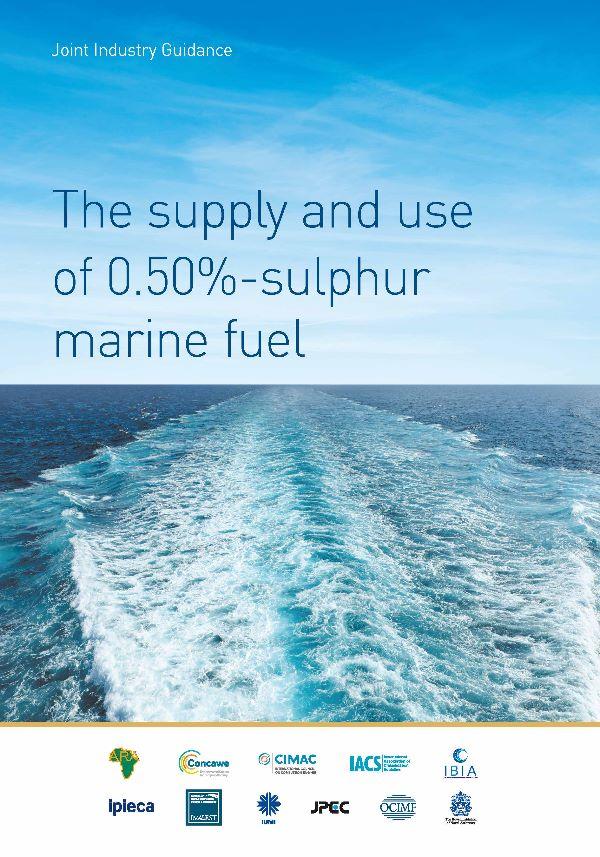
Available online: Sulphur 2020 training course
Developed by OCIMF, IPIECA and other participating organisations, this e-learning module is based on material published in the Joint Industry Guidance – The supply and use of 0.50%-sulphur fuel.
It is designed to provide guidance for use across the marine fuels and shipping industries, and addresses specific issues relating to the introduction and use of max. 0.50%-sulphur fuel oils.
The Joint Industry Guidance information paper is available for free download here.
For more information contact Dave Wall, Senior Technical Adviser or the Publications team.
Click here to access the e-learning course
Tanker Accident Database
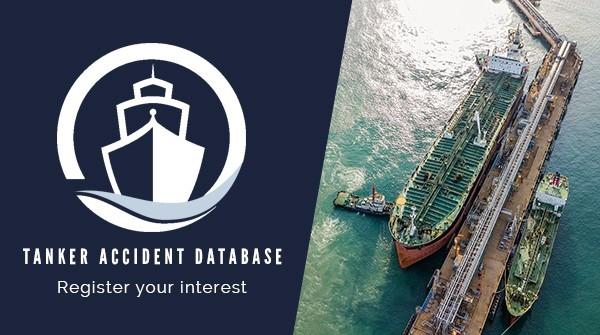
The Learning Lessons, Accidents, Statistics and Trends (LLAST) database, known as the Tanker Accident Database, provides an anonymous reporting tool for vessel owners and technical managers to document measurable accident data.
The aim is to collate anonymous tanker accident details which, over time, will allow for root cause analysis of tanker accidents, preventing repeat accidents and leading to further advances in maritime best practice and safety.
There has already been a strong uptake in participants registering their interest by signing up to join a mailing list. Visit the Tanker Accident Database website to register. Registered users will be alerted once the database goes live.
For more information contact Dave Wall, Senior Technical Adviser or Ricardo Martinez, Technical Adviser (Engineering).
Registration open
North America Regional Marine Forum 2020
Tuesday, 24 March 2020 Hyatt Regency, New Orleans, USA
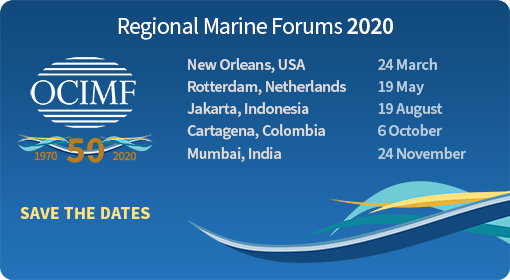
A Report from the OCIMF Vessel Incident Repository
The OCIMF launched its SIRE Vessel Incident Repository in response to a desire from vessel operators to be able to submit incident reports directly to a central reporting platform which could be accessed by all OCIMF members.
The repository is in its sixth year of operation and has over 1,100 reports, with reports being submitted at the rate of approximately 20 per month. This can certainly be improved.
The repository primarily functions to facilitate the ease of reporting incidents and subsequent investigations to oil companies' vetting departments by allowing operators to upload files of different types and by having a simplified reporting process.
OCIMF members can access reports as soon as they are uploaded and review them along with their associated investigation reports, including contributory factors and root causes, where identified. Operators can report corrective actions that they may have taken as well as any measures that may have been implemented to prevent recurrence.
This repository is a valuable tool that ensures continuous improvement to safety management systems, standards, procedures and practices.
The Tanker Management Self Assessment (TMSA) programme, which is designed to help operators assess, measure and improve management systems, reports incidents and subsequent investigations to oil companies as a key performance indicator to achieve level 3 in element 8 (Incident Reporting, Investigation and Analysis).
While we wish you a safe and incident-free year, vessel operators are still encouraged to report all incidents as they happen, and we encourage our members to reinforce this message.
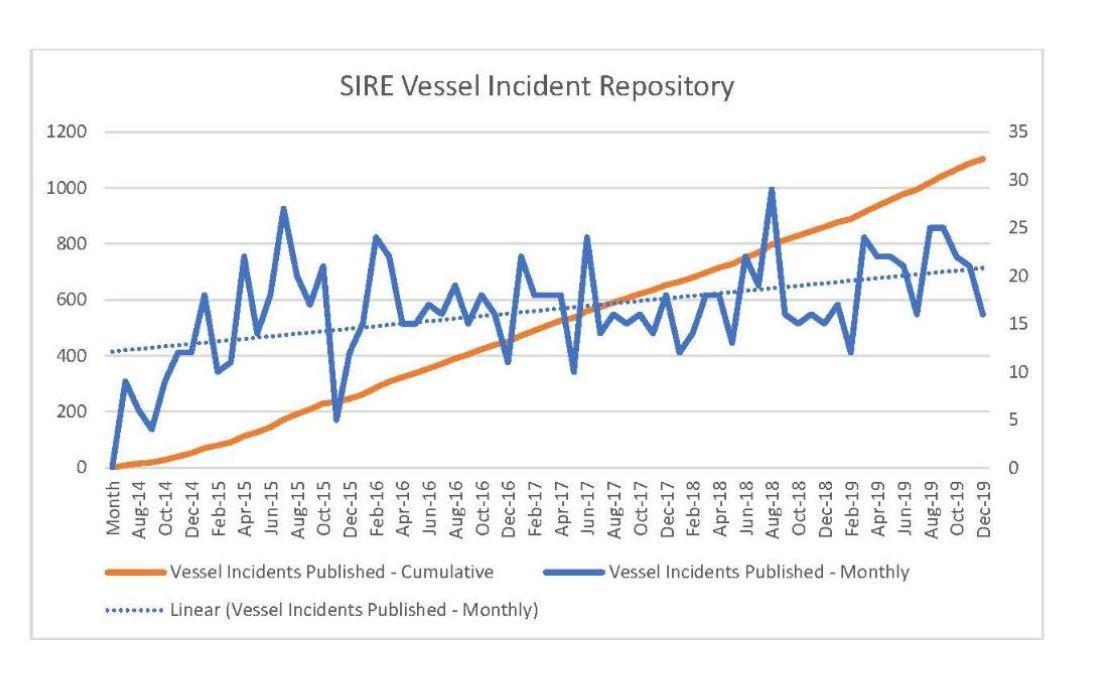
Register now for the 20th OVID User Group meeting
The 20th OVID User Group meeting (OUG20) will take place in Houston, USA on 11 February 2020.
Due to space restrictions, we may need to limit the number of places for each organisation in attendance. Places will be allocated on a first-come first-served basis.
To reserve your place, click here
Maritime Security Snippets
Increased kidnappings in the Gulf of Guinea: International Maritime Bureau Annual Report 2019
The International Maritime Bureau report highlights a decline in overall piracy incidents but an increase in kidnappings across the Gulf of Guinea.
In 2019 the International Maritime Bureau's (IMB) Piracy Reporting Centre received 162 incidents of piracy and armed robbery against ships worldwide, compared to 201 reported incidents in 2018. These incidents included 130 vessels boarded, 4 hijacked vessels, 17 attempted attacks and 11 vessels fired upon.
The full report can be downloaded here.
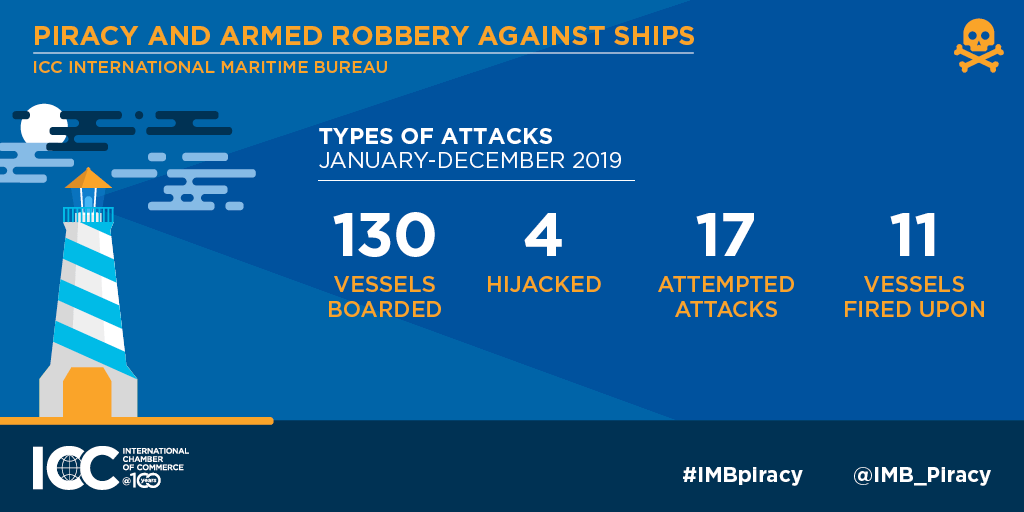
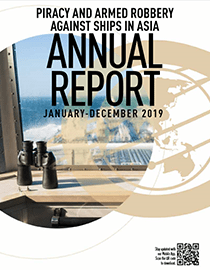
ReCAAP ISC report shows increase in number of incidents since 2018
The Regional Cooperation Agreement on Combating Piracy and Armed Robbery against ships in Asia Information Centre (ReCAAP ISC) released its annual report for 2019.
This report highlights:
- A total of 82 incidents of piracy and armed robbery against ships.
- This shows an increase in both total numbers of incidents and actual numbers of incidents from 2018
- Two of the 82 incidents were piracy and 80 were armed robbery against ships.
The full report is available on the ReCAPP ISC website.

